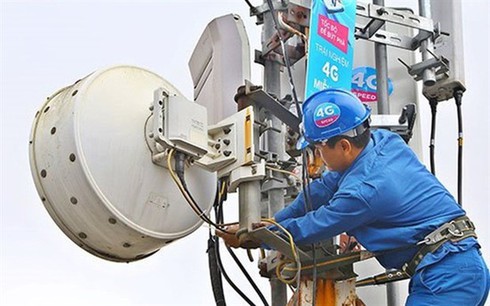 |
|
The Ministry of Information and Communications has urged the Authority of Radio Frequency Management to bid the 2.6 Ghz band right after Lunar New Year. (Source: cafef.vn)
|
Nguyen Duc Trung, Director of the authority, said the authority had met with representatives from the Ministry of Finance, Ministry of Justice, and Ministry of Planning and Investment to soon complete necessary procedures for the practice.
The 2.6Ghz spectrum is an important resource to expand 4G coverage, especially in provinces and cities with a high concentration of 4G subscribers.
Vietnamese mobile networks are currently operating four mobile technologies including 2G, 3G, 4G and 5G, said the Vietnam Telecommunications Authority (VNTA).
This caused high operating costs for businesses, while they could not focus resources on new generation mobile technology, it said.
Radiofrequency resources are split, reducing resource efficiency and affecting the quality of services provided to customers, said VNTA.
Previously, the Government requested the Ministry of Information and Communications speed up the licensing process of 2.6 GHz band to deploy 4G network for telecommunication enterprises in accordance with the law before June 20 this year.
In compliance with the Government's request for frequency band planning, the Ministry of Information and Communications will formulate a roadmap and submit to the Government the suspension of 2G technology and license 5G for commercial use this year.
Deputy Prime Minister Vu Duc Dam chaired a meeting with representatives of ministries and agencies to remove difficulties in granting broadbands, improving the quality and services of 4G networks in July 2018.
Currently, the bandwidth flow for 4G networks on the 1800 MHz band, which also serves 2G networks, is too low compared to actual needs, affecting the quality of 4G speed and service.
The average speed of internet in Vietnam ranks 75th in the world.
Therefore, the Ministry of Information and Communications plans to license the 2.6 GHz spectrum to enable telecommunications firms to improve their 4G networks.
The Ministry of Information and Communications licensed Viettel to test the new 2.6 GHz frequency in 12 provinces and cities on December 30 last year.
Viettel said that in the past, to serve the needs of 4G with more than 38,000 stations amid a lack of frequency resources, the firm had to optimise the entire 1800MHz band of the 2G network and a part of the 2,100 MHz bands of the 3G network. VNA
 Minister of Information and Communications Nguyen Manh Hung has urged the Authority of Radio Frequency Management to auction off space on the 2.6 Ghz spectrum.
Minister of Information and Communications Nguyen Manh Hung has urged the Authority of Radio Frequency Management to auction off space on the 2.6 Ghz spectrum.